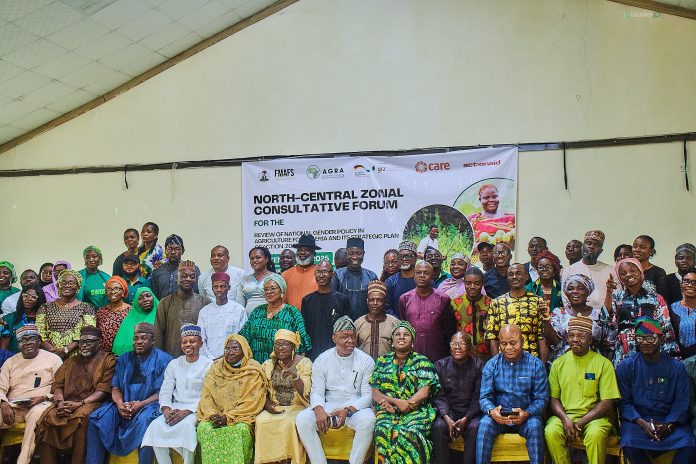Commissioners for Agriculture and Food Security from the six North-Central states have reaffirmed their commitment to gender inclusivity and sustainable growth in agriculture, with plans to review the National Gender Policy and Strategic Plan of Action (2025–2030).
This was disclosed at the North-Central Zonal Consultative Forum in Lafia, Nasarawa State, where Commissioners from Benue, Kogi, Kwara, Nasarawa, Niger, and Plateau states met with the academia, civil society and development partners to chart ways for gender inclusion and sustainable agricultural practices in the region.
READ ALSO, Kogi East Stakeholders Pass Votes of Confidence on Tinubu, Ododo
Speaking at the event, Kogi State Commissioner for Agriculture and Food Security, Timothy Ojomah explained that 67 percent of participants in agricultural programmes in the state in the 2024 farming season were women and youths, while the figure has risen to 80 percent in 2025.
Ojomah described this as a deliberate action to address agitations and promote inclusivity by the administration of Governor Ahmed Usman Ododo.
“This is a deliberate action to ensure inclusivity and address agitations; North-Central will not take last, we are determined to lead this campaign, and Nigeria will follow.”
News Hour Video; FG ASSURES OF TIMELY COMPLETION OF ROAD PROJECT IN KOGI
Also speaking, the Managing Director of the Kogi State Agricultural Development Project(ADP), Dr. Bello Ogirima, emphasized the strategic importance of Kogi State as a hub for food production.
He explained that Kogi’s location, bordering about ten states and proximity to Abuja, makes its agricultural activities vital to the entire country.
“Our production is ever demanding, and the government under Governor Ahmed Usman Ododo, alongside our Commissioner for Agriculture, Hon. Timothy Ojomah, has ensured that agriculture is always at the front burner. Mobilizing our women and youths to farm is now a deliberate policy that has made Kogi better today.” He added.
Similarly, Kwara State Commissioner for Agriculture and Rural Development, Hon. Abdulaziz Alabi, outlined his state’s interventions to ensure inclusiveness stressing that the Kwara State Governor, AbdulRahman AbdulRazaq has deliberately carried along women, youths and people living with disabilities in all agricultural initiatives.
“This forum is a testament to the importance of inclusivity. It has brought together academia, civil society, and stakeholders to amplify voices on gender equity in agriculture,” he said.
Other speakers at the event agreed to work together as a bloc to mainstream gender equity and inclusion in agricultural development policies and programmes in the region.




